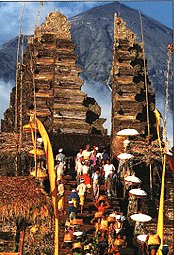Bali: Island of The God
 Even today, there is a certain magic about Bali. The longer one stays on the island, the more one is impressed by the many exquisite sights and the scores of talented and charming people one encounters. All the tourist hype aside, Bali truly is exceptional.
Even today, there is a certain magic about Bali. The longer one stays on the island, the more one is impressed by the many exquisite sights and the scores of talented and charming people one encounters. All the tourist hype aside, Bali truly is exceptional.Bali has long been equated with an exotic paradise, a picturesque vision of green rice fields and plantations, soaring volcanoes, cool lakes and rushing rivers, lush forests and palm fringed beaches. It is Indonesia's number one tourist destination and as a result suffers from commercialisation and overcrowding, but this is confined to a few main areas. The original charm of the 'Island of the Gods' and its smiling people is still very much in evidence, especially in the many small rural villages and fascinating places of the fertile interior.
The island of Bali indeed presents a modern paradox - an ancient, traditional society that is still incredibly alive and vital. While the basic conservatism of the Balinese has enabled them to preserve many of their past achievements, it has never hindered the acceptance of new and innovative elements, whether home-grown or foreign.
Another distinctive unique of Bali from the rest of Indonesia is the belief in a predominantly Hindu faith, incorporating the ancient Indonesian animist conviction that natural objects are inhabited by good or bad spirits into every aspect of local life on the island. It is evident in their ceremonies, daily rituals and attitudes, visible in the offerings of flowers and food that adorn the roadsides, the charms hung inside taxis, and the numerous vibrant festivals that occur throughout the year. It is perceptible in their reverence for the Holy Mountain, the soaring volcanic cone of Gunung Agung, which is the spiritual centre of the Balinese universe. Scattered around the island are thousands of Hindu temples and places of worship. Art is also an integral part of daily life and every village has its artists, from the internationally acclaimed painter to the aspirational young cow herder. Ubud, the cultural centre, with its streets lined with art and crafts shops, also has performances of traditional Balinese dance and music. Art, together with tourism, is an important source of revenue for the island.
First and foremost, Bali is extraordinarily blessed by Nature. Lying within a narrow band of the tropics where wet and dry seasons fall roughly into balance - providing both adequate rainfall and long periods of sunshine - the island's soils, topography and water resources are all remarkably well suited to human habitation. As a result, Bali has been civilized since very early times.
This is also the only island in "inner Indonesia" that has enjoyed centuries of more or less uninterrupted cultural continuity. While other traditional states in the region suffered major disruptions due to Islamization and Dutch colonization, Bali was isolated, left to go her own way.
Balinese society remains strong and vital, moreover, because it promotes family and communal values. This is indeed the key - a self-strengthening system in which religion, custom and art combine with age-old childrearing techniques and deeply-entrenched village institutions to produce an exceptionally well-integrated society. Feelings of alienation from parents and peers, so common now in the West are rare in Bali.
Children are carried everywhere until they are at least three months old, held at all times in the warm, protective embrace of family, friends and neighbors. Elaborate rituals are performed at frequent intervals to ensure their well-being. Every aspect of village life is organized to the nth degree - the individual's rights and responsibilities within the community being carefully defined by tradition.
Despite all this, it should be noted that traditional Bali was far from perfect. For the majority of Balinese peasants, it was in fact a world wracked by warfare, disease, pestilence and famine. In this century, moreover, Bali was continuously plagued by political violence, over-population and poverty.
Bali's unique culture should in fact be viewed as a response to difficult, uncertain conditions. Its strong village institutions served as bulwarks against the ever-present threat of disaster; their inherent flexibility was a guarantee of survival in the face of often overwhelming odds.
The rapid changes now occurring on the island must be seen from this historical perspective. Certainly there are problems, some perhaps as serious as those faced in earlier times. But the Balinese are eternal optimists, fervently believing that their "Island of the Gods" enjoys a very special place indeed in the grander scheme of things.
















0 Comments:
Post a Comment
<< Home